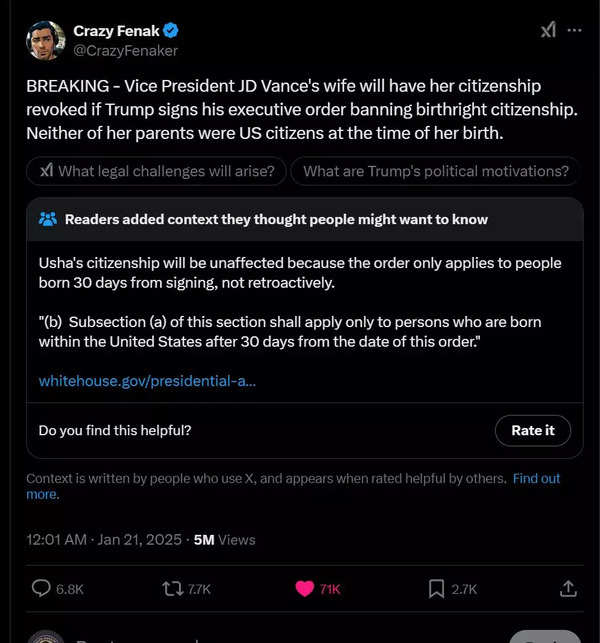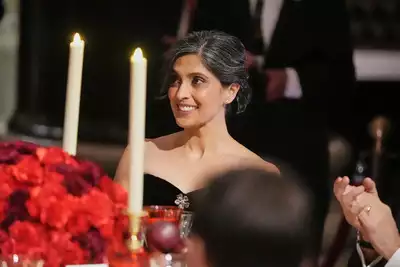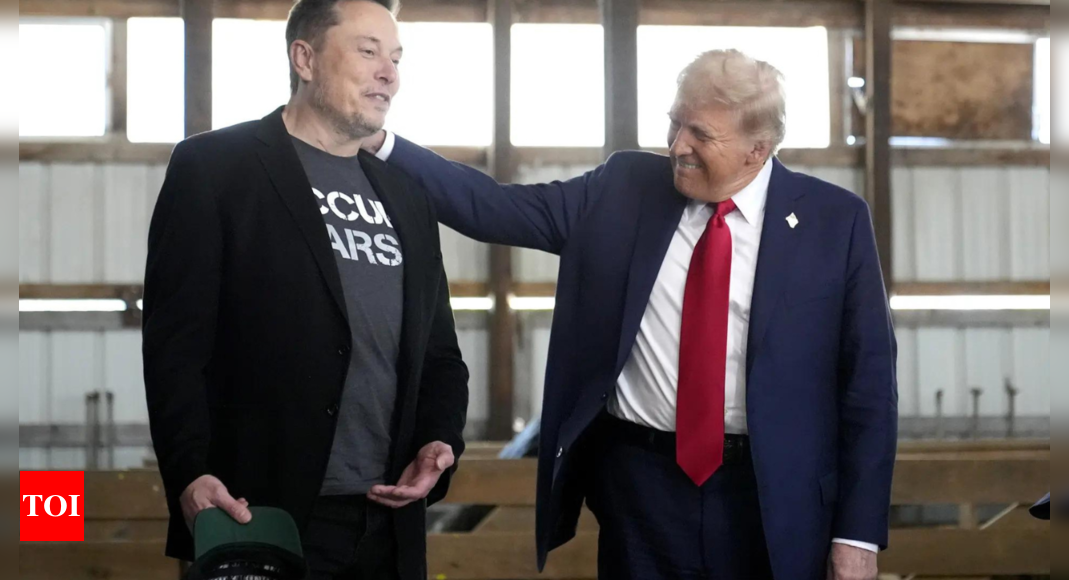On Tuesday, a Twitter handle claimed that JD Vance’s wife Usha Vance would lose her citizenship since her parents weren’t US citizens at the time of her birth. The theory comes after Donald Trump’s recent order in which he would overturn years of jus soli (birthright by soil) citizenship for children born to illegal immigrants or when the person’s mother was “lawful but temporary”.
Usha Vance’s parents, Krish and Lakshmi Chilukuri, immigrated to the United States from Andhra Pradesh, India, in the 1980s. However, publicly available information does not specify the exact date when they became US citizens. Both have established successful careers in the U.S.; Krish Chilukuri is an aerospace engineer and lecturer at San Diego State University, and Lakshmi Chilukuri is a biologist and provost at the University of California, San Diego.

The actual order read: “Among the categories of individuals born in the United States and not subject to the jurisdiction thereof, the privilege of United States citizenship does not automatically extend to persons born in the United States: (1) when that person’s mother was unlawfully present in the United States and the father was not a United States citizen or lawful permanent resident at the time of said person’s birth, or (2) when that person’s mother’s presence in the United States at the time of said person’s birth was lawful but temporary (such as, but not limited to, visiting the United States under the auspices of the Visa Waiver Program or visiting on a student, work, or tourist visa) and the father was not a United States citizen or lawful permanent resident at the time of said person’s birth.”
Would this make Usha Vance, the first Indian-American Second Lady’s citizenship void? Well, not quite, since the order is only valid for those born within the US after 30 days from the date of the order. Ergo, there’s no way Usha Vance will lose her citizenship under the current Trump executive order.
However, things aren’t that rosy for many members of the diaspora.
How new Trump order affects the Indian diaspora
The order, which ends automatic birthright citizenship for children of certain legal non-immigrant visa holders, has left many families shocked. This significant shift in US immigration policy targets children born to individuals on temporary visas, such as H-1B work visas, H-4 dependent visas, or F-1 student visas, if at least one parent is not a green card holder or US citizen.
Read: How the new Trump order could affect one million Indians in Green Card Queue?
This decision directly impacts over one million Indians awaiting employment-based green cards, many of whom face decades-long backlogs. Previously, these families relied on the assurance that children born in the US would automatically gain citizenship, providing a pathway to later sponsor their parents. With this change, those children must either self-deport upon turning 21 or seek another visa status. Immigration attorneys argue this interpretation contradicts the 14th Amendment, which grants citizenship to nearly all individuals born on US soil, barring exceptions like children of diplomats.
The move has already prompted lawsuits from organisations like the American Civil Liberties Union (ACLU) and immigration attorneys, challenging the EO’s constitutionality. Legal experts, including Cyrus Mehta and Greg Siskind, predict the case will reach the Supreme Court, where a conservative majority may uphold Trump’s interpretation. The EO asserts that the phrase “subject to the jurisdiction thereof” excludes individuals born to temporary visa holders, a claim heavily disputed by immigration advocates. They argue this interpretation deviates from established precedents, such as the Supreme Court ruling that granted citizenship to a child born to Chinese immigrants who were not US citizens.
The order also underscores potential gender biases, explicitly mentioning “mother” and “father” roles, which critics view as an outdated perspective. Moreover, the ripple effects are significant: Indian families, already grappling with lengthy green card queues, now face additional uncertainty regarding their children’s futures.
The policy shift has fuelled polarising opinions. While some applaud the decision as a step towards stricter immigration control, others criticise it as a punitive measure targeting law-abiding immigrants. Amidst this controversy, the fate of affected families and the legal battle over the EO’s validity hang in the balance, with far-reaching implications for US immigration policy and the interpretation of the 14th Amendment.




